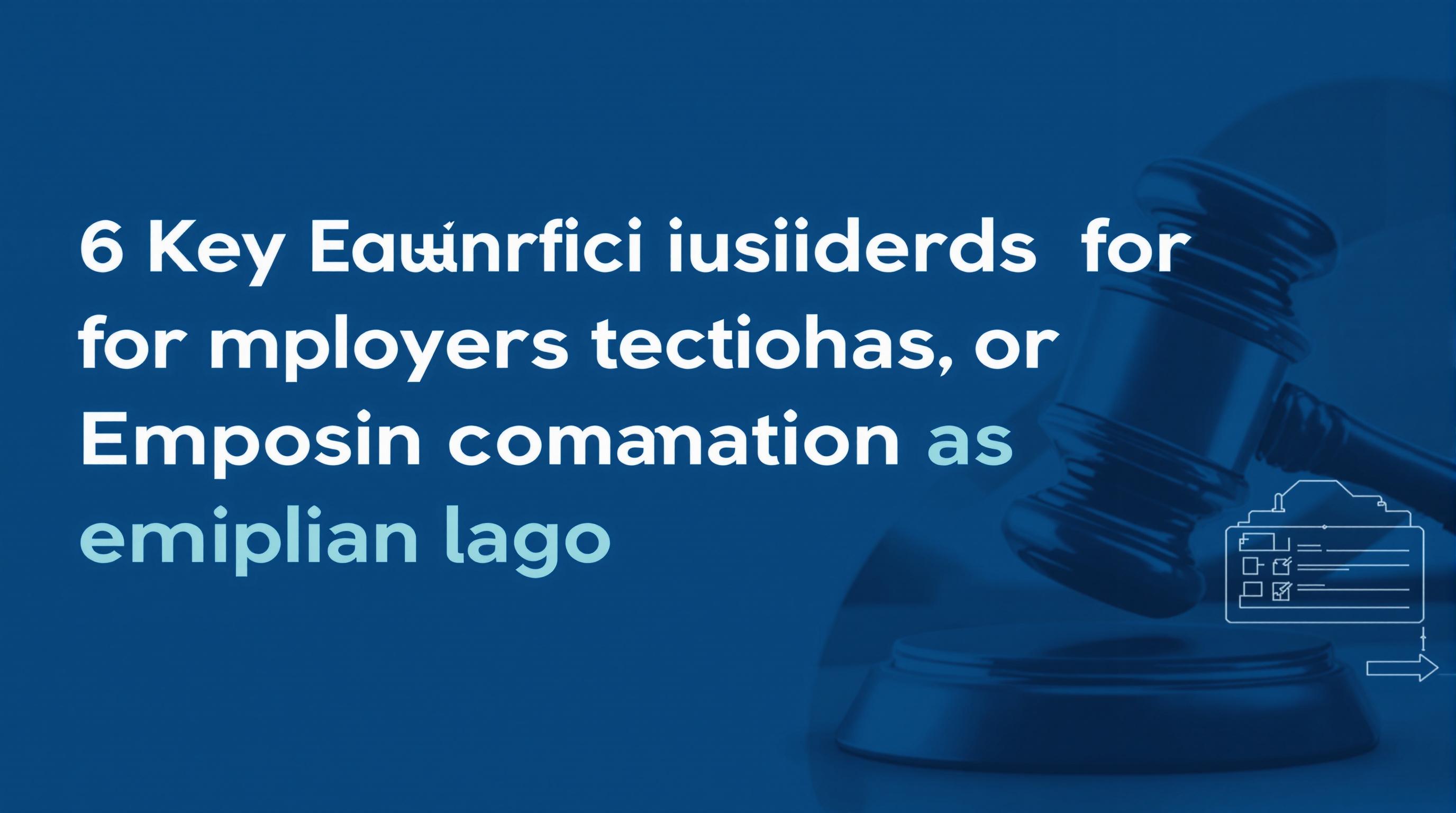Related Articles
- Top 6 AI-Powered Underwriting Platforms from the Past 5 Years Disrupting Traditional Risk Models in 2024
- How Uncommon Insurance Amendments Influence Unexpected Claims and Shape Policyholder Behavior in Quiet Corners
- 7 Underrated Indexed Insurance Products from the Last 5 Years That Outsmart Traditional Plans
- Unveiling the Role of Universal Life Insurance in Protecting Digital Legacies and Cryptocurrency Estates
- Top 6 Under-the-Radar Group Insurance Plans Since 2019 Redefining Employer and Employee Value
- How Childhood Genetics Influence Insurance Premiums and What Parents Rarely Know About Policy Risks
9 Lesser-Known Legal Pitfalls in Group Insurance Plans That HR Managers Must Avoid in 2024
9 Lesser-Known Legal Pitfalls in Group Insurance Plans That HR Managers Must Avoid in 2024
9 Lesser-Known Legal Pitfalls in Group Insurance Plans That HR Managers Must Avoid in 2024
1. Misclassification of Employees as Ineligible
HR managers often struggle with the distinction between eligible and ineligible employees for group insurance plans. Misclassification can lead to serious legal consequences, including penalties and retroactive coverage requirements. For instance, categorizing part-time or temporary employees as ineligible without understanding policy definitions can trigger violations under the Affordable Care Act (ACA).
It is crucial to thoroughly review the specific eligibility criteria outlined in the group insurance plan documents as well as relevant local and federal regulations. Advisory from legal counsel or benefits specialists can ensure compliance before finalizing eligibility lists. Additionally, clear communication with employees about their status helps avoid misunderstandings and potential disputes.
Failing to properly classify employees not only risks non-compliance but may also damage employee trust, leading to morale issues within the organization. Keeping up to date with evolving regulations and insurance provider interpretations in 2024 ensures HR departments stay ahead of this common pitfall.
2. Noncompliance with Mental Health Parity Laws
The Mental Health Parity and Addiction Equity Act (MHPAEA) requires group health plans to provide comparable benefits for mental health and substance use disorder services as for medical/surgical care. Many HR managers unintentionally violate this by imposing stricter limits on mental health coverage.
Common errors include setting lower visit limits, higher copayments, or requiring more stringent prior authorizations for mental health services. In 2024, regulators continue to emphasize enforcement, and violations can result in corrective actions and fines.
To avoid these problems, HR teams should conduct periodic reviews of insurance plan benefits, comparing mental health components against medical benefits. Legal updates and insurer communications should also be monitored to ensure ongoing parity compliance.
3. Lack of Clear Continuation of Coverage Policies
Continuation of coverage provisions, such as COBRA, allow eligible employees and dependents to maintain insurance temporarily after certain qualifying events. When plans lack clear policies or fail to adequately notify beneficiaries, HR managers risk non-compliance with federal laws.
In 2024, the rules governing notification timelines and eligibility have seen subtle amendments, making it vital to maintain updated documentation and communication processes. Some employers have faced legal action simply due to late or incomplete COBRA notices.
HR should implement regular training on COBRA procedures, maintain accurate records of qualifying events, and utilize automated systems to trigger timely notification letters. Clear guidance to employees about their rights and obligations also reduces legal risks.
4. Ignoring Inclusivity of Domestic Partners
Many group insurance plans continue to omit coverage for domestic partners, which can lead to discriminatory practices, particularly in states with marriage equality protections. HR managers sometimes overlook this requirement during plan design and updates.
Failing to include domestic partner coverage where legally mandated exposes companies to discrimination claims and potential penalties. This is especially relevant in 2024 as more jurisdictions have enacted inclusive benefit laws.
Reviewing local and state regulations annually to confirm coverage requirements helps HR avoid this legal pitfall. Additionally, clear benefit enrollment guidance ensures employees understand their options relating to domestic partner coverage.
5. Inadequate Documentation of Waivers for Declined Coverage
Employees sometimes opt out of group insurance coverage for various reasons, but without properly documented waivers, employers face compliance risks if coverage is later challenged. This lack of documentation is surprisingly common and often overlooked in HR processes.
Legal scrutiny can arise during audits or disputes, demanding proof that an employee knowingly declined coverage. This is particularly critical for benefits tied to employer mandates or tax considerations.
To prevent this pitfall, HR managers should implement standardized waiver forms that clearly outline the consequences of declining coverage. Maintaining these records securely and making them easily retrievable supports legal compliance and audit readiness.
6. Overlooking Impact of Domestic Violence Protections
Recent expansions in domestic violence protections affect group insurance plan policies, requiring accommodations such as confidential enrollment and coverage options for victims. HR departments unfamiliar with these updated legal requirements risk penalties for noncompliance.
Victims may need to change beneficiaries or obtain special enrollment in insurance without triggering usual waiting periods. Failure to facilitate these accommodations can be viewed as discriminatory treatment.
HR managers should collaborate with legal counsel to update internal procedures in 2024, ensuring alignment with domestic violence survivors' rights. Training staff on sensitive handling of these cases is also essential in mitigating legal exposure.
7. Mismanagement of Dependent Eligibility Verification
Group insurance plans require verification of dependents’ eligibility to prevent fraud and unauthorized coverage. However, improper or inconsistent dependent audits can put companies at legal and financial risk, especially if they fail to comply with data privacy laws.
In 2024, privacy regulations such as HIPAA require that personal information gathered during verification is protected. Mishandling this data during audits may lead to data breaches and regulatory penalties.
HR managers should conduct dependent eligibility reviews systematically, using secure methods for collecting and storing sensitive information. Clear policies explaining the purpose and scope of verification to employees also reduce resistance and improve compliance.
8. Failure to Address Plan Design for Remote Employees
The rise of remote work poses complex challenges to group insurance plan compliance. Offering equitable benefits to remote employees across different states requires awareness of varying insurance laws and mandates.
Ignoring state-specific rules may result in coverage gaps or violations related to mandated benefits, network adequacy, or consumer protections. HR managers risk legal claims if plan designs do not accommodate employees residing in multiple jurisdictions.
To avoid this pitfall, in 2024 HR teams should work closely with insurers and legal advisors to tailor plan designs that comply with relevant state laws. Keeping accurate records of employee locations further supports compliance and effective benefits administration.
9. Neglecting Updates on Tax Treatment of Group Insurance Benefits
Tax regulations relating to group insurance benefits continually evolve, affecting both employers and employees. Inattention to recent updates can lead to misreporting income or benefits, triggering IRS penalties or unexpected tax liabilities.
For example, changes in Health Savings Account (HSA) eligibility rules and reporting requirements have been enacted recently. HR managers unfamiliar with these changes risk improper payroll deductions or misinformation to plan participants.
Staying current on tax rulings and collaborating with payroll and tax advisors helps HR departments maintain compliance. Providing clear communication to employees about taxable benefits enhances transparency and prevents confusion.




